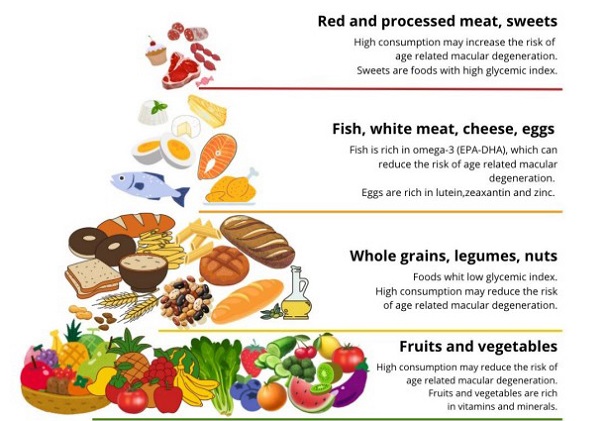New Hope for Age-Related Macular Degeneration - The Power of Antioxidants and Diet
Nikhil Prasad Fact checked by:Thailand Medical News Team Jun 23, 2024 1 year, 6 months, 1 week, 5 days, 4 hours, 46 minutes ago
Health News: As we age, our eyes become more susceptible to various diseases, with age-related macular degeneration (AMD) being one of the most common causes of vision loss globally. AMD significantly affects the quality of life, particularly in older adults, leading to severe vision impairment and even blindness. Recent studies covered in this
Health News report by researchers from the University of Milan-Italy, Luigi Curto Hospital, Azienda Sanitaria Locale Salerno-Italy and the University of Cagliari-Italy,highlight the potential role of antioxidants and diet in managing and possibly preventing AMD.
 Simplified schematic representation of the food pyramid showing the possible role of food intake on age-related macular degeneration.
Understanding Age-Related Macular Degeneration
Simplified schematic representation of the food pyramid showing the possible role of food intake on age-related macular degeneration.
Understanding Age-Related Macular Degeneration
AMD primarily affects the macula, the part of the retina responsible for clear vision in the direct line of sight. It is a multifactorial disorder influenced by genetics, aging, smoking, obesity, poor diet, and cardiovascular issues. The disease progresses through two stages: early and late AMD. Early AMD is characterized by the presence of drusen (yellow deposits under the retina), while late AMD leads to more severe vision loss due to the deterioration of retinal cells.
The Role of Oxidative Stress and Inflammation
Oxidative stress, neuroinflammation, and ocular ischemia are significant contributors to AMD. Oxidative stress occurs when there's an imbalance between free radicals and antioxidants in the body, leading to cellular damage. This damage triggers inflammation, further exacerbating the condition. Antioxidants, which can neutralize free radicals, are believed to play a crucial role in protecting the eyes from these harmful processes.
Antioxidants and Their Impact
Several studies have explored the benefits of antioxidants in AMD management. These antioxidants can be obtained through diet or supplements. Key antioxidants include:
-Lutein and Zeaxanthin: These carotenoids are found in high concentrations in the retina and are known for their ability to filter harmful blue light and protect against oxidative damage. They are present in foods like kale, spinach, broccoli, and egg yolks.
-Vitamins C and E: These vitamins are potent antioxidants. Vitamin C, found in fruits and vegetables, helps maintain the health of blood vessels in the eye. Vitamin E, present in nuts and seeds, protects cells from damage.
-Zinc: This essential mineral plays a vital role in maintaining eye health and is found in high concentrations in the retina. Foods rich in zinc include meat, shellfish, and legumes.
-Omega-3 Fatty Acids: Found in fish like salmon and tuna, these fatty acids have anti-inflammatory properties that are beneficial for eye health.
Scientific Evidence Supporting Antioxidant Use
The Age-Related Eye Disease Study (AREDS) and its follow-up, AREDS2, have provided substantial evidence supporting the use of antioxidants in AMD management. The AREDS formula, which includes vitamins C and E, zinc, and beta-carotene, was shown to reduce the risk of advanced AMD by about 25%. AREDS2 improved upon this by adding lutein, zeaxanthin, and omega-3 fatty acids, offering similar protective benefits.
Diet and AMD
Beyond supplements, diet plays a pivotal role in AMD management. A diet rich in fruits, vegetables, and fish can provide essential nutrients that protect against AMD. The Mediterranean diet, which emphasizes fruits, vegetables, whole grains, and healthy fats like olive oil, has been associated with a lower risk of AMD.
New Antioxidants on the Horizon
In addition to well-known antioxidants, new compounds like astaxanthin and melatonin are being studied for their potential benefits in AMD:
-Astaxanthin: This carotenoid, found in marine organisms like shrimp and algae, has shown higher antioxidant activity than lutein and zeaxanthin. It may help reduce inflammation and prevent the formation of new blood vessels that can worsen AMD.
-Melatonin: Known for regulating sleep, melatonin also has antioxidant properties that can protect retinal cells from damage.
Conclusion
While traditional treatments for AMD, such as anti-VEGF injections, remain essential, incorporating antioxidants through diet or supplements offers a promising complementary approach. Continued research is necessary to fully understand the optimal dosages and combinations of these antioxidants. However, current evidence suggests that a diet rich in fruits, vegetables, and healthy fats, along with targeted supplements, can play a significant role in managing and potentially preventing AMD.
By making informed dietary choices and considering antioxidant supplements, individuals can take proactive steps to protect their vision and maintain eye health as they age.
The study findings were published in the peer reviewed Journal of Personalized Medicine.
https://www.mdpi.com/2075-4426/14/6/653
For the latest
Health News, keep on logging to Thailand Medical News.
Read Also:
https://www.thailandmedical.news/news/new-hope-for-age-related-macular-degeneration-vitamin-d-and-sulforaphane-s-synergistic-effects
https://www.thailandmedical.news/news/microrna-let-7f-identified-as-a-key-player-in-dry-age-related-macular-degeneration
